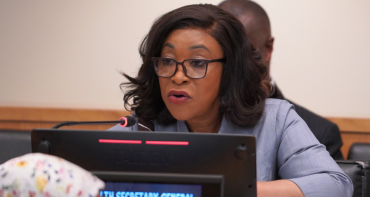Commonwealth countries are using innovation and ingenuity to counter threats of injustice and inequality from Covid-19.

Commonwealth countries are using innovation and ingenuity to counter threats of injustice and inequality from Covid-19.
The global pandemic has caused significant disruption to justice systems in large and small countries.
Covid-19 impact on access to justice
Access to justice has been impacted in various ways, especially for vulnerable people, from courts being closed and case backlogs building up, to the passing of rights-restricting emergency legislation that will possibly have long-term adverse effects.
A Global Access to Justice Project report collected data from 51 countries, a third of them Commonwealth members, and found only eight per cent of justice systems have continued to work normally.
There have also been worrying trends such as a surge in domestic violence across the Commonwealth. Calls to hotlines for victims of abuse and demand for support services have risen from between 30 and 500 per cent during Covid-19 lockdowns.
Spikes in online child abuse and cybercrime have been linked to the pandemic’s impact as well.
New approaches
Amid the turmoil, some member countries have adapted quickly and found smart new approaches to overcoming the challenges.
Justice Joel Ngugi, a judge in Kenya’s High Court, reported a “stupendous” uptake in video-conferencing and other technology.
Speaking during one of a series of Rule of Law webinars organised by the Commonwealth Secretariat, he said Covid-19 has accelerated digitalisation and “courts have gone almost completely virtual”.
This has led to justice being speedier and less costly for many people, thanks to measures such as video hearings and the electronic servicing of documents.
Justice Ngugi said: “We are seeing the slow death of procedural formalism in the law. Things that people have held as sacrosanct, we are seeing those dying.
“This will be the greatest impact of the pandemic on our justice system.”
Other positive initiatives in the Commonwealth include a legal hotline in South Africa and a free app for women in Uganda to seek advice.
In Scotland in the UK, jury trials have switched to a mix of physical and remote settings. Judges, lawyers, accused and witnesses are in socially-distanced courtrooms, while jurors are in jury centres away from the building and appear in the courtroom via a video wall.
Justice Gillian Lucky, from the Court of Appeal of Trinidad and Tobago, and Justice Bernard Turner, from the Supreme Court of the Bahamas, highlighted during the final webinar how judge-alone trials had become more widespread during the pandemic.
The Commonwealth Secretary-General noted there have been “innovations and mini-revolutions” taking place in justice systems.
Patricia Scotland said: “The closure of courts in some countries has necessitated the rapid adoption of new technology.
“It has also required all actors in our justice systems to move away from the idea that justice can be delivered only in courthouses.
“In many cases changes are here to stay, and there is need for increased use of technology. There is no going back to how we did business before.”
The Secretary-General highlighted measures the Commonwealth has taken, such as the Commonwealth Says NO MORE campaign that confronts domestic and sexual violence.
A digital portal has been designed to support governments and civil society in identifying and implementing joint solutions while also providing individuals with concrete actions they can take.
Commonwealth Rule of Law webinar series
The Rule of Law webinars have brought together chief justices, attorneys general, academics, international experts and heads of Commonwealth partner organisations.
They have discussed the enormous problems faced by justice systems, but have also shared knowledge and best practices for upholding the rule of law in the context of the pandemic.



